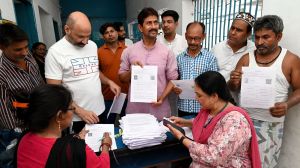Survey: Many above poverty line, but still vulnerable
The Economic Survey 2007-08, presented in Parliament on Thursday, has expressed concern over a large section...

The Economic Survey 2007-08, presented in Parliament on Thursday, has expressed concern over a large section of population, who, even after rising above the poverty line (PL), still have to spend a substantial amount of their income on food items, keeping them a vulnerable section of the society.
The Survey indicated that even the population with their monthly per capita consumption expenditure about twice the PL remained vulnerable both in rural and urban areas. Citing the expenditure on food as an ‘indicative of vulnerability to some extent’, the Survey revealed the rural and urban people even with twice the PL monthly expenditures, had to spend more than 55 and 43 per cent of their monthly expenditures respectively on food items on an average.
The Economic Survey, which is a report card on the state of economy, also underscores the importance of better delivery of government services to the people to address the rural-urban divide and inter-state disparity.
It underlined the fact the Compound Annual Growth Rate (CAGR) of monthly consumption of richer upper half of the urban people grew at a faster pace than the overall consumption growth of rural people during the reforms decade of 1993-94 to 2004-05.
The Survey reports that while the overall rural consumption grew at about 1.16 per cent, the consumption of richer half of urban population ranged between 1.17 to 2.10 per cent. “The ongoing reforms attach great importance to removal of poverty and addressing specifically the wide variations across States and the rural-urban divide.”
“However, disparities continue at the state and regional level. Better governance and improved service delivery are essential to ensure that leakages are plugged and the funds under the welfare schemes reach the intended beneficiaries to the maximum extent,” observes the Survey, pointing to the higher outlays for the social sectors and improvement in social indicators. Considering various welfare schemes being a state subject and their implementation primarily dependent upon the state administration, the Survey suggested the states will have to increasingly share more burden for scheme on the lines of proposed funding of Sarva Shiksha Abhiyan (SSA).



- 01
- 02
- 03
- 04
- 05




























